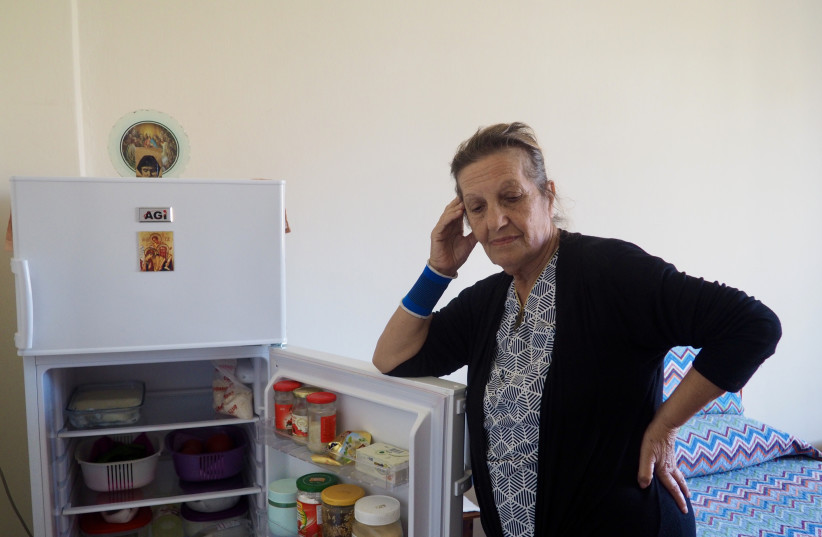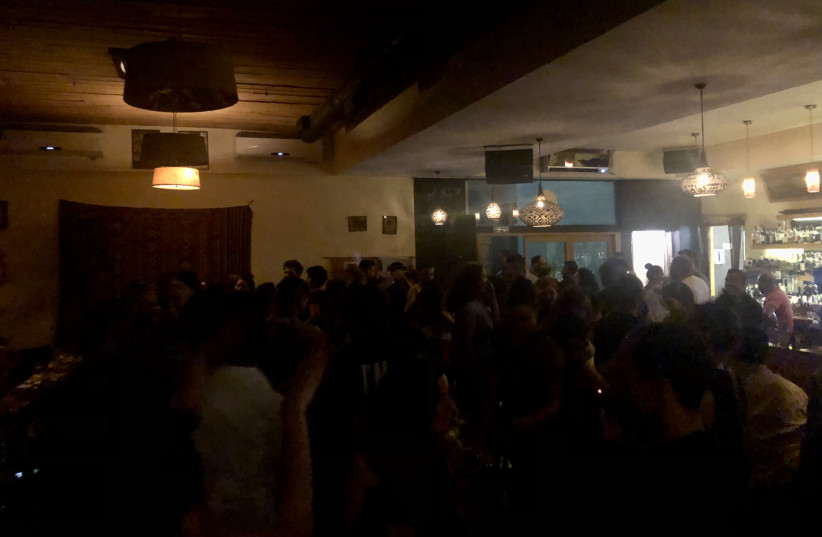[Beirut] – Em Rafi spends her days cooking, cleaning and praying.
For more stories from The Media Line go to themedialine.org
“What else is there to do without electricity in the house?” asked the resident of Beirut as she boiled some water to take a shower.
The 77-year-old Armenian Lebanese woman is afraid that she will fall down while she is carrying the hot water to the bathroom. “Since the explosion in August 2020, my hip has not been the same, I barely leave the house,” she explained, referring to the Beirut Port explosion, which killed over 220 people and wounded 7,000, and also devastated the capital leaving some 300,000 people homeless.
The current economic crisis in Lebanon has left many in the country without electricity. The government is not providing power, so the population is relying on private generators that run on fuel. But not everyone can afford it.
“How am I going to pay $66 just to be able to connect the fridge and the washing machine for some hours a day?” Rafi asked. “How can I pay for that?”

Rafi’s husband died five years ago and, since the blast in the Beirut Port that severely damaged her house, she has not been able to work.
“I used to be a seamstress but the explosion destroyed my sewing machine and my children can’t buy me a new one, nor are any NGOs providing me with my work tool,” she said. “I really want to work, I just need the machine,” Rafi told The Media Line.
Her story is emblematic of everyone’s story in a country that has been left in the dark. The periods of prolonged darkness due to power outages have dyed Lebanon’s once lively streets black.

Lebanon's economic crisis hits electrical grid
“Before the crisis, we only had three hours without electricity so we could manage without the generator, but now it is impossible.”
Raeda Al Habbal
Since the end of the country’s civil war in 1990, the Lebanese people have had to live with a weak public electric system. In the 1990s, the management of the Électricité du Liban, the public company that is supposed to provide the country with electricity, started to crumble. The old infrastructure, along with the increasing debt that now makes up 40% of Lebanon’s public debt, forced the company to implement a daily three-hour load shedding – used to relieve stress on a primary energy source when demand for electricity is greater than the primary power source can supply – since the 2006 Israeli-Lebanese conflict. Since then, many private companies have emerged to provide households with private generators to cover those hours-long power cuts.
“Before the crisis, we only had three hours without electricity so we could manage without the generator, but now it is impossible,” Raeda Al Habbal told The Media Line. This young doctor from Syria has been living in Lebanon for twelve years and she has seen how the standard of living in the country where she chose to build her career keeps plummeting. “Now, despite paying huge amounts of money to our generator owner, we only have electricity for 12 hours per day,” she said.
Al Habbal has stopped buying dairy products, and she just purchases meat when she knows she is going to cook it the same day.
“It is too risky to keep them in the fridge,” she said. “I don’t want to have to throw them away later; these things are not cheap.”
In August, Lebanon’s annual inflation rate was 161.8%. This increase has had a dramatic impact on the prices of basic goods, making most of them unaffordable to the general population. According to the United Nations, three quarters of the Lebanese population is living under the poverty line.
“The prices are going up and it is a huge burden in the pocket when you want to provide the basic needs for yourself,” Al Habbal explained. Trying to have electricity at home “is a big part of where we are all spending our money,” she added.
But many people living in Lebanon have been forced to find alternatives to be able to live and work when there is no power. At Al Habbal’s home, the Wi-Fi is connected to a UPS battery and the household uses lights that work only on batteries.
At Saint George Hospital, where Al Habbal works, they have found other options so that patients’ lives are not put at risk. “Ventilators are engineered with a battery so they don’t stop working suddenly, like the lights in the operating room,” she said.
Since Lebanon has never had a functioning 24/7 electricity system, most institutions have their own private generators. But in the past, the generators were only used to cover the three-hour power cuts. “Now, the lack of governmental electricity has forced hospitals to spend more money to provide fuel for the generators, so that is why the price of medical treatments has increased,” Al Habbal explained.
Marina El Khawand knows very well the situation in the health sector. After the Beirut Port blast, the 21-year-old law student created Medonations, a volunteer-based initiative that provides medications for those who can’t afford them. For the last couple of years, people in Lebanon have struggled to find even the most basic treatments available. The 95% depreciation of the Lebanese lira has made it impossible to import the vast majority of medications. At least once a week, El Khawand meets “superheroes” at the airport who bring suitcases full of medications.
But their tireless efforts are not enough. “I am not able to help all the patients, even though I have all the resources outside to do so but I don’t have the infrastructure to secure it,” El Khawand said.
With a group of volunteers and thanks to donations, the initiative’s volunteers managed to build a storage room for the drugs with the right levels of temperature and humidity. But many treatments, especially vaccines, need to be stored in the refrigerator and the unstable electricity situation stops Medonations from getting them. “I don’t want to put my patients at risk; in some way, there is a barrier in front of us that doesn’t allow us to get drugs,” she explained.
Now, Medonations is helping over 18,000 patients throughout Lebanon. “The same amount of people, though, are being deprived of help because of electricity issues, so even if we are losing one life, it’s one life lost to these electricity problems caused by the corruption of our government,” El Khawand said.
And it is not just the public electric system that is almost nonexistent. The state infrastructure has suffered decades of unchecked spending, corruption and a preference for quick fixes over sustainable solutions. Now it is reaching a breaking point.
Many thousands of state employees are in a state of permanent strike. The average salary of a public worker went from $1,000 a month to barely $50. Some of them, such as policemen and soldiers, have taken second jobs to make ends meet. Those who are staying in their positions face days without air conditioning in the summer and no water in their office bathrooms. Nearly six out of 10 state employees are leaving or planning to leave, a rate not seen since Lebanon's civil war.
While rationing of electricity remains severe across the country, solar panels were installed this summer on the rooftop of the headquarters of the Électricité du Liban in Sidon, a southern city. Many people saw it as another sign of incongruity in Lebanon’s bizarre collapse. Meanwhile, public institutions are joining the people’s efforts to gain access to power and solar panels are becoming increasingly common on every rooftop in Lebanon.
Jad Hamdan is the operations manager of the iconic Mezyan restaurant in Beirut’s vibrant Hamra neighborhood. “We have recently installed solar panels to cut the cost of our generator,” he told The Media Line. Every month the restaurant spends up to $2,500 to pay for the fuel that allows its generator to work. The solar energy might help them cut the cost to run the generator by half or even less.
“Many restaurants are suffering because of (lack of) electricity: some only have power for 10 hours a day, so they order their products on a daily basis to avoid any damage,” Hamdan explained.
But there is still a long way to go before things improve. “I don’t think that in our country with all of this corruption there is going to be any improvement in the coming months,” the restaurant manager said. “Nobody knows exactly how many years we will need to get better because we don’t trust our regime and how they deal with things,” he told The Media Line.
Inside and outside of the households and businesses, the darkness is taking over. Crime rates are going up and the feeling of insecurity dominates society.
Marina El Khawand doesn’t go out at night anymore. “Being outside of your home and seeing no light makes you feel like something is not okay,” she said after handing some free medicines to Em Rafi. Sitting in her spotless living room, both women, despite being generations apart, agree. “At this point, only God will help us,” they concluded.
